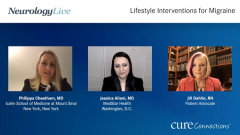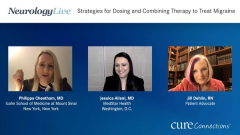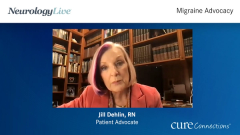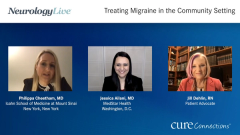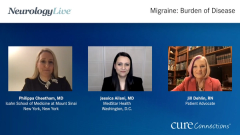
Quality of Life for Patients With Migraine
Philippa Cheetham, MD, and Jill Dehlin, RN, comment on the severity of migraine attacks and concerns that migraines may trigger more series events.
Episodes in this series

Philippa Cheetham, MD: Jill, we hear many stories about patients who have this chronic migraine that goes on and on and how it’s become part of their life and their family’s life. They try to manage it as best as they can. There is such a huge spectrum of presentation. I remember the first migraine that I had diagnosed was after a collapse, a severe headache that resulted in calling 911. I was admitted to the emergency department with a suspected subarachnoid hemorrhage. I could not believe the following day, when the neurologist came and said to me that this was a really bad migraine. I could not believe that the severity of the headache could come from a migraine as opposed to a brain tumor or a brain hemorrhage. You must talk to so many people with your wealth of experience and the longevity of living with migraine. Do you hear patients say, “I’m really scared that there may be something else going on. Do I have a brain tumor?” When patients with migraines get that feeling in their head like their head is going to explode, and they present concerns about rupturing a blood clot in their brains, do you have these conversations? Do you hear people worrying about whether the intensity of symptoms could potentially signal something more serious?
Jill Dehlin, RN: Many times, people are worried about that, and Dr Jessica Ailani will probably speak to why imaging is not recommended for people with migraine. In your circumstance—where you had this thunderclap situation and severe pain—I talk to people who are concerned about that, and mostly those fears exist because of the stigma around migraine. There are no real objective data; it is all subjective information that you are getting from a patient. There is no objective test that says, “Yes, you’ve got migraine disease”; therefore, patients with migraine are not believed very often.
Philippa Cheetham, MD: Let’s talk In terms of the impact that this has had on your life. I certainly am proactive if I know a migraine is coming on. I know there are certain things that I cannot do and will not do. Do you find that you end up adjusting your work and life schedules when a migraine is coming on? What are the things that you know are off the menu when you are suffering with a bad migraine?
Jill Dehlin, RN: People with migraine disease are very protective of our lifestyle because our brains need homeostasis and sameness—we need a regimented schedule where we get the same amount of sleep, we eat at a regular time, and rely on the same stimulation as Dr Ailani said. Your brain is just hypersensitized. She was talking about how we can smell things, see things, hear things, and taste things. I call those my super-Spidey senses. Those are some of the things that we have to deal with, so we have to plan ahead. I never go anywhere without a pair of sunglasses, ear plugs, and usually my medicines. I need to do that because if I’m in a situation where it is quite loud or bright—for example, if I am driving in the wintertime in Michigan where I live, the sun peeks through the branches on the trees, and that causes a strobe-like effect—I have to be quite careful. All of us with migraine work our lives around our triggers and trying to prevent them.
Philippa Cheetham, MD: Thank you for watching Neurology Live® Cure Connections®. If you enjoyed the program, please subscribe to our e-newsletter to receive upcoming programs and other great content right in your in-box. Thank you so much.
Transcript Edited for Clarity
Newsletter
Keep your finger on the pulse of neurology—subscribe to NeurologyLive for expert interviews, new data, and breakthrough treatment updates.






